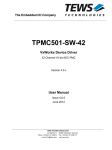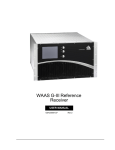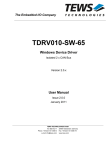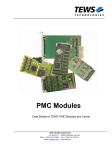Download User Manual - TEWS TECHNOLOGIES
Transcript
The Embedded I/O Company TPMC501-SW-65 Windows Device Driver Optically Isolated 32 Channel 16 Bit ADC Version 2.0.x User Manual Issue 2.0.0 March 2011 TEWS TECHNOLOGIES GmbH Am Bahnhof 7 25469 Halstenbek, Germany Phone: +49 (0) 4101 4058 0 Fax: +49 (0) 4101 4058 19 e-mail: [email protected] www.tews.com TPMC501-SW-65 This document contains information, which is proprietary to TEWS TECHNOLOGIES GmbH. Any reproduction without written permission is forbidden. Windows Device Driver Optically Isolated 32 Channel 16 Bit ADC TEWS TECHNOLOGIES GmbH has made any effort to ensure that this manual is accurate and complete. However TEWS TECHNOLOGIES GmbH reserves the right to change the product described in this document at any time without notice. Supported Modules: TPMC501 TEWS TECHNOLOGIES GmbH is not liable for any damage arising out of the application or use of the device described herein. 2004-2011 by TEWS TECHNOLOGIES GmbH Issue Description Date 1.0 First Issue August 4, 2004 1.0.1 General revision, new address TEWS LLC May 20, 2009 2.0.0 Windows 7 support, API functions added March 4, 2011 TPMC501-SW-65 – Windows Device Driver Page 2 of 43 Table of Contents 1 2 INTRODUCTION......................................................................................................... 4 INSTALLATION.......................................................................................................... 5 2.1 Software Installation .......................................................................................................................5 2.1.1 Windows 2000 / XP..............................................................................................................5 2.1.2 Windows 7............................................................................................................................6 2.1.3 Confirming Driver Installation ...............................................................................................6 3 API DOCUMENTATION ............................................................................................. 7 3.1 General Functions...........................................................................................................................7 3.1.1 tpmc501Open.......................................................................................................................7 3.1.2 tpmc501Close ......................................................................................................................9 3.2 Device Access Functions.............................................................................................................11 3.2.1 tpmc501Read.....................................................................................................................11 3.2.2 tpmc501StartSequencer ....................................................................................................14 3.2.3 tpmc501GetDataBuffer ......................................................................................................17 3.2.4 tpmc501StopSequencer.....................................................................................................20 3.2.5 tpmc501SetModelType ......................................................................................................22 3.2.6 tpmc501GetModuleInfo......................................................................................................24 4 DEVICE DRIVER PROGRAMMING ......................................................................... 26 4.1 TPMC501 Files and I/O Functions ...............................................................................................26 4.1.1 Opening a TPMC501 Device .............................................................................................26 4.1.2 Closing a TPMC501 Device ...............................................................................................28 4.1.3 TPMC501 Device I/O Control Functions............................................................................29 4.1.3.1 IOCTL_TPMC501_READ...........................................................................................31 4.1.3.2 IOCTL_TPMC501_START_SEQ ...............................................................................34 4.1.3.3 IOCTL_TPMC501_STOP_SEQ .................................................................................39 4.1.3.4 IOCTL_TPMC501_CONF_MOD_TYPE.....................................................................40 4.1.3.5 IOCTL_TPMC501_MOD_INFO..................................................................................42 TPMC501-SW-65 – Windows Device Driver Page 3 of 43 1 Introduction The TPMC501-SW-65 Windows device driver is a kernel mode driver which allows the operation of the supported hardware module on an Intel or Intel-compatible Windows operating system. Supported Windows versions are: Windows 2000 Windows XP Windows XP Embedded Windows 7 (32bit and 64bit) The standard file and device (I/O) functions (CreateFile, CloseHandle, and DeviceIoControl) provide the basic interface for opening and closing a resource handle and for performing device I/O control operations. The TPMC501-SW-65 device driver supports the following features: reading converted AD values from a specified channel configuring the sequencer for a free running measurement direct transfer of converted AD values to a dynamic ring buffer in the user space of the application task (Direct I/O) AD data correction with factory calibration data stored in the onboard EEPROM The TPMC501-SW-65 device driver supports the modules listed below: TPMC501 Optically Isolated 32 Channel 16 Bit ADC (PMC) To get more information about the features and use of TPMC501 devices it is recommended to read the manuals listed below. TPMC501 User manual TPMC501 Engineering Manual TPMC501-SW-65 – Windows Device Driver Page 4 of 43 2 Installation Following files are located in directory TPMC501-SW-65 on the distribution media: i386\ amd64\ installer_32bit.exe installer_64bit.exe tpmc501.inf tpmc501.h example\tpmc501exa.c api\tpmc501api.c api\tpmc501api.h TPMC501-SW-65-2.0.0.pdf Release.txt ChangeLog.txt Directory containing driver files for 32bit Windows versions Directory containing driver files for 64bit Windows versions Installation tool for 32bit systems (Windows XP or later) Installation tool for 64bit systems (Windows XP or later) Windows installation script Header file with IOCTL codes and structure definitions Example application Application Programming Interface source Application Programming Interface header This document Information about the Device Driver Release Release history 2.1 Software Installation 2.1.1 Windows 2000 / XP This section describes how to install the TPMC501 Device Driver on a Windows 2000 / XP operating system. After installing the TPMC501 card(s) and boot-up your system, Windows 2000 / XP setup will show a "New hardware found" dialog box. 1. The "Upgrade Device Driver Wizard" dialog box will appear on your screen. Click "Next" button to continue. 2. In the following dialog box, choose "Search for a suitable driver for my device". Click "Next" button to continue. 3. In Drive A, insert the TPMC501 driver disk; select "Disk Drive" in the dialog box. Click "Next" button to continue. 4. Now the driver wizard should find a suitable device driver on the diskette. Click "Next" button to continue. 5. Complete the upgrade device driver and click "Finish" to take all the changes effect. 6. Now copy all needed files (tpmc501.h and API files) to the desired target directories. After successful installation the TPMC501 device driver will start immediately and creates devices (TPMC501_1, TPMC501_2 ...) for all recognized TPMC501 modules. TPMC501-SW-65 – Windows Device Driver Page 5 of 43 2.1.2 Windows 7 This section describes how to install the TPMC501-SW-65 Device Driver on a Windows 7 (32bit or 64bit) operating system. Depending on the operating system type, execute the installer binaries for either 32bit or 64bit systems. This will install all required driver files using an installation wizard. Copy needed files (tpm501.h and API files) to desired target directory. After successful installation a device is created for each module found (TPMC501_1, TPMC501_2 ...). 2.1.3 Confirming Driver Installation To confirm that the driver has been properly loaded, perform the following steps: 1. Open the Windows Device Manager: a. For Windows 2000 / XP, open the "Control Panel" from "My Computer" and click the "System" icon and choose the "Hardware" tab, and then click the "Device Manager" button. b. For Windows 7, open the "Control Panel" from "My Computer" and then click the "Device Manager" entry. 2. Click the "+" in front of "Embedded I/O". The driver "TEWS TECHNOLOGIES - TPMC501 32(16) Channel 16-Bit ADC (TPMC501)" should appear for each installed device. TPMC501-SW-65 – Windows Device Driver Page 6 of 43 3 API Documentation 3.1 General Functions 3.1.1 tpmc501Open NAME tpmc501Open – Opens a Device SYNOPSIS TPMC501_HANDLE tpmc501Open ( char *DeviceName ); DESCRIPTION Before I/O can be performed to a device, a file descriptor must be opened by a call to this function. PARAMETERS DeviceName This parameter points to a null-terminated string that specifies the name of the device. EXAMPLE #include “tpmc501api.h” TPMC501_HANDLE hdl; /* ** open file descriptor to device */ hdl = tpmc501Open(“\\\\.\\TPMC501_1” ); if (hdl == NULL) { /* handle open error */ } TPMC501-SW-65 – Windows Device Driver Page 7 of 43 RETURNS A device handle, or NULL if the function fails. To get extended error information, call GetLastError. ERROR CODES All error codes are standard error codes set by the I/O system. TPMC501-SW-65 – Windows Device Driver Page 8 of 43 3.1.2 tpmc501Close NAME tpmc501Close – Closes a Device SYNOPSIS TPMC501_STATUS tpmc501Close ( TPMC501_HANDLE hdl ); DESCRIPTION This function closes previously opened devices. PARAMETERS hdl This value specifies the device handle to the hardware module retrieved by a call to the corresponding open-function. EXAMPLE #include “tpmc501api.h” TPMC501_HANDLE hdl; TPMC501_STATUS result; /* ** close file descriptor to device */ result = tpmc501Close( hdl ); if (result != TPMC501_OK) { /* handle close error */ } TPMC501-SW-65 – Windows Device Driver Page 9 of 43 RETURNS On success TPMC501_OK, or an appropriate error code. ERROR CODES All error codes are standard error codes set by the I/O system. TPMC501-SW-65 – Windows Device Driver Page 10 of 43 3.2 Device Access Functions 3.2.1 tpmc501Read NAME tpmc501Read – Read converted AD value SYNOPSIS TPMC501_STATUS tpmc501Read ( TPMC501_HANDLE hdl, int channel, int gain, int flags, int *pAdcVal ); DESCRIPTION This function starts an AD conversion on the specified channel and returns the converted value. PARAMETERS hdl This argument specifies the device handle to the hardware module retrieved by a call to the corresponding open-function. channel This argument specifies the input channel number. Valid channels for single-ended mode are 1…32, for differential mode 1...16. gain This argument specifies the input gain that shall be used. Allowed values are 1, 2, 5, 10 or 1, 2, 4, 8 depending on the module type. TPMC501-SW-65 – Windows Device Driver Page 11 of 43 flags Set of bit flags that control the AD conversion. The following flags could be OR’ed: Flag Meaning TPMC501_DIFF If this flag is set the ADC input works in differential mode otherwise in single-ended (default). TPMC501_CORR Perform an offset and gain correction with factory calibration data stored in the TPMC501 EEPROM. TPMC501_FAST If this flag is set the fast (polled) mode will be used. The driver will not use interrupts, instead it will wait in a busy loop until the settling time (if necessary) and the conversion is finished. Conversions using this mode will be handled faster, but the processor executes a busy loop and other tasks will not be handled during the loops. pAdcVal This argument points to an integer variable where the AD value will be returned. EXAMPLE #include “tpmc501api.h” TPMC501_HANDLE TPMC501_STATUS int int channel gain flags hdl; result; AdcData; channel, gain, flags; = 32; = 2; = TPMC501_CORR | TPMC501_FAST; result = tpmc501Read(hdl, channel, gain, flags, &AdcData); if (result != TPMC501_OK) { /* handle error */ } TPMC501-SW-65 – Windows Device Driver Page 12 of 43 RETURNS On success, TPMC501_OK is returned. In the case of an error, the appropriate error code is returned by the function. ERROR CODES TPMC501_ERR_ACCESS The module type has not been configured. TPMC501_ERR_INVALID_HANDLE The specified TPMC501_HANDLE is invalid. TPMC501_ERR_INVAL At least one of the parameters is invalid. TPMC501_ERR_TIMEOUT ADC conversion timed out. TPMC501_ERR_RANGE Invalid channel number. TPMC501_ERR_BUSY This error occurs if the sequencer is still running. Please stop the sequencer before executing this function. TPMC501-SW-65 – Windows Device Driver Page 13 of 43 3.2.2 tpmc501StartSequencer NAME tpmc501StartSequencer – Start sequencer operation SYNOPSIS TPMC501_STATUS tpmc501StartSequencer ( TPMC501_HANDLE hdl, unsigned int CycleTime, unsigned int NumOfBufferPages, unsigned int NumOfChannels, TPMC501_CHAN_CONF *ChanConf ); DESCRIPTION This function starts an AD conversion on the specified channel and returns the converted value. PARAMETERS hdl This argument specifies the device handle to the hardware module retrieved by a call to the corresponding open-function. CycleTime This argument specifies the repeat frequency of the sequencer in 100 μs steps. Each time the sequencer timer reaches the programmed cycle time a new AD conversion of all active channels is started. Valid values are in the range from 100 μs to 6.5535 seconds. NumOfBufferPages This argument specifies the number of sample blocks in the ring buffer. A sample block contains the samples of all channels (NumOfChannels) per sequencer cycle. NumOfChannels This argument specifies the number of active channels for this job. The maximum number is 32. ChanConf This array of channel configuration structures specifies the configuration of the active channels. The channel configuration defines the channel number, the gain and some flags. The ordering of channels in a ring buffer page is the same as defined in this array. TPMC501-SW-65 – Windows Device Driver Page 14 of 43 typedef struct { UINT32 ChanToUse; UINT32 gain; UINT32 flags; } TPMC501_CHAN_CONF, *PTPMC501_CHAN_CONF; ChanToUse This parameter specifies the input channel number. Valid channels for single-ended mode are 1…32, for differential mode 1...16. gain This Parameter specifies the gain for this channel. Valid gains are 1, 2, 5, 10 for TPMC501-10/-12/-20/-22 and 1, 2, 4, 8 for TPMC501-11/-13/-21/-23. flags Set of bit flags that control the AD conversion. The following flags could be OR’ed: Flag Meaning TPMC501_DIFF If this flag is set the ADC input works in differential mode otherwise in single-ended (default). TPMC501_CORR Perform an offset and gain correction with factory calibration data stored in the TPMC501 EEPROM. EXAMPLE #include “tpmc501api.h” TPMC501_HANDLE TPMC501_STATUS unsigned int unsigned int unsigned int TPMC501_CHAN_CONF hdl; result; CycleTime; NumOfBufferPages; NumOfChannels; ChanConf[TPMC501_MAX_CHAN]; CycleTime = 5000; NumOfBufferPages = 100; int NumOfChannels = 2; ChanConf[0].ChanToUse ChanConf[0].gain ChanConf[0].flags = 1; = 1; = TPMC501_CORR; ChanConf[1].ChanToUse ChanConf[1].gain ChanConf[1].flags … = 20; = 5; = TPMC501_CORR; TPMC501-SW-65 – Windows Device Driver Page 15 of 43 // start the sequencer result = tpmc501StartSequencer(hdl, CycleTime, NumOfBufferPages, NumOfChannels, ChanConf); if (result != TPMC501_OK) { /* handle error */ } RETURNS On success, TPMC501_OK is returned. In the case of an error, the appropriate error code is returned by the function. ERROR CODES TPMC501_ERR_ACCESS The module type has not been configured. TPMC501_ERR_INVALID_HANDLE The specified TPMC501_HANDLE is invalid. TPMC501_ERR_INVAL At least one of the parameters is invalid. TPMC501_ERR_RANGE Invalid channel number. TPMC501_ERR_BUSY This error occurs if the sequencer is still running. Please stop the sequencer before executing this function. TPMC501-SW-65 – Windows Device Driver Page 16 of 43 3.2.3 tpmc501GetDataBuffer NAME tpmc501GetDataBuffer – Get next data block of sequencer samples SYNOPSIS TPMC501_STATUS tpmc501GetDataBuffer ( TPMC501_HANDLE hdl, int **pData, unsigned int *pStatus ); DESCRIPTION This function returns a pointer to the next available data block in the ring buffer. If no data block is available the functions returns TPMC501_ERR_NODATA. In this case it must be called again until new data are available. PARAMETERS hdl This argument specifies the device handle to the hardware module retrieved by a call to the corresponding open-function. pData This argument is a pointer to an array of integer items that contains the converted data of all configured channels of a sequencer cycle. The number of channels and the channel configuration was setup with the tpmc501StartSequencer function. The first array item [0] belongs to the channel configured by ChanConfig[0], the second array item [1] belongs to the channel configured by ChanConfig[1] and so forth. Please refer to the example application for details. TPMC501-SW-65 – Windows Device Driver Page 17 of 43 pStatus This argument is a pointer to a variable which returns the actual sequencer error status. Keep in mind to check this status before each reading. If status is 0 no error is pending. A set of bits specifies the error condition. Value Description TPMC501_BUF_OVERRUN This bit indicates a ring buffer overrun. The error occurred if there is no space in ring buffer to write the new AD data. In this case the new AD values are dismissed. The sequencer was not stopped. TPMC501_DATA_OVERFLOW This indicates an overrun in the sequencer data RAM. The error occurred if the driver is too slow to read the data in time. The sequencer was stopped after this error occurred. TPMC501_TIMER_ERR Sequencer timer error (see also TPMC501 hardware manual). The sequencer was stopped after this error occurred. TPMC501_INST_RAM_ERR Sequencer instruction RAM error (see also TPMC501 hardware manual). The sequencer was stopped after this error occurred. EXAMPLE #include “tpmc501api.h” TPMC501_HANDLE TPMC501_STATUS unsigned int int hdl; result; seqStatus; *pData; result = tpmc501GetDataBuffer(hdl, &pData, &seqStatus); if (result != TPMC501_OK) { if (result == TPMC501_ERR_NODATA) { /* try again reading data */ } else { /* handle error */ } } TPMC501-SW-65 – Windows Device Driver Page 18 of 43 RETURNS On success, TPMC501_OK is returned. In the case of an error, the appropriate error code is returned by the function. ERROR CODES TPMC501_ERR_INVALID_HANDLE The specified TPMC501_HANDLE is invalid. TPMC501_ERR_NODATA No new data available in the ring buffer TPMC501_ERR_NOT_READY The sequencer is stopped. TPMC501-SW-65 – Windows Device Driver Page 19 of 43 3.2.4 tpmc501StopSequencer NAME tpmc501StopSequencer – Stop the sequencer SYNOPSIS TPMC501_STATUS tpmc501StopSequencer ( TPMC501_HANDLE hdl ); DESCRIPTION This function stops execution of the sequencer mode on the specified device. PARAMETERS hdl This argument specifies the device handle to the hardware module retrieved by a call to the corresponding open-function. EXAMPLE #include “tpmc501api.h” TPMC501_HANDLE TPMC501_STATUS hdl; result; result = tpmc501StopSequencer(hdl); if (result != TPMC501_OK) { /* handle error */ } TPMC501-SW-65 – Windows Device Driver Page 20 of 43 RETURNS On success, TPMC501_OK is returned. In the case of an error, the appropriate error code is returned by the function. ERROR CODES TPMC501_ERR_INVALID_HANDLE TPMC501-SW-65 – Windows Device Driver The specified TPMC501_HANDLE is invalid. Page 21 of 43 3.2.5 tpmc501SetModelType NAME tpmc501SetModelType – Set the module type of the TPMC501 SYNOPSIS TPMC501_STATUS tpmc501SetModelType ( TPMC501_HANDLE hdl, int ModuleType ); DESCRIPTION This TPMC501 function configures the model type of the TPMC501. This function must be called before the first AD conversion can be started. PARAMETERS hdl This argument specifies the device handle to the hardware module retrieved by a call to the corresponding open-function. ModuleType This argument specifies the model type of the TPMC501. The following model types are supported. Value Description TPMC501_TYPE_10 TPMC501-10 (Gain 1/2/5/10, +/-10V, Front I/O) TPMC501_TYPE_11 TPMC501-11 (Gain 1/2/4/8, +/-10V, Front I/O) TPMC501_TYPE_12 TPMC501-12 (Gain 1/2/5/10, 0-10V, Front I/O) TPMC501_TYPE_13 TPMC501-13 (Gain 1/2/4/8, TPMC501_TYPE_20 TPMC501-20 (Gain 1/2/5/10, +/-10V, Back I/O) TPMC501_TYPE_21 TPMC501-21 (Gain 1/2/4/8, +/-10V, Back I/O) TPMC501_TYPE_22 TPMC501-22 (Gain 1/2/5/10, 0-10V, Back I/O) TPMC501_TYPE_23 TPMC501-23 (Gain 1/2/4/8, TPMC501-SW-65 – Windows Device Driver 0-10V, Front I/O) 0-10V, Back I/O) Page 22 of 43 EXAMPLE #include “tpmc501api.h” TPMC501_HANDLE TPMC501_STATUS hdl; result; result = tpmc501SetModelType(hdl, TPMC501_TYPE_11); if (result != TPMC501_OK) { /* handle error */ } RETURNS On success, TPMC501_OK is returned. In the case of an error, the appropriate error code is returned by the function. ERROR CODES TPMC501_ERR_INVALID_HANDLE The specified TPMC501_HANDLE is invalid. TPMC501_ERR_RANGE Invalid channel number. TPMC501-SW-65 – Windows Device Driver Page 23 of 43 3.2.6 tpmc501GetModuleInfo NAME tpmc501GetModuleInfo – Get module information data SYNOPSIS TPMC501_STATUS tpmc501GetModuleInfo ( TPMC501_HANDLE hdl, TPMC501_INFO_BUFFER *pModuleInfo ); DESCRIPTION This function reads module information data such as configured module type, location on the PCI bus and factory programmed correction data. PARAMETERS hdl This argument specifies the device handle to the hardware module retrieved by a call to the corresponding open-function. pModuleInfo This argument specifies a pointer to the module information buffer. typedef struct { UINT32 Variant; UINT32 PciBusNo; UINT32 PciDevNo; UINT32 ADCOffsetCal[4]; UINT32 ADCGainCal[4]; } TPMC501_INFO_BUFFER, *PTPMC501_INFO_BUFFER; Variant This parameter returns the configured module variant (e.g. 10 for a TPMC501-10). PciBusNo, PciDevNo These parameters specifies the PCI location of this module TPMC501-SW-65 – Windows Device Driver Page 24 of 43 ADCOffsetCal[4] This array returns the factory programmed offset correction value for the different gains. Array index 0 contains the value for gain 1, index 1 contains the value for gain 2 and so forth. ADCGainCal[4] This array returns the factory programmed gain correction for the different gains. Array index 0 contains the value for gain 1, index 1 contains the value for gain 2 and so forth. EXAMPLE #include “tpmc501api.h” TPMC501_HANDLE TPMC501_STATUS TPMC501_INFO_BUFFER hdl; result; ModuleInfo result = tpmc501GetModuleInfo(hdl, &ModuleInfo); if (result != TPMC501_OK) { /* handle error */ } RETURNS On success, TPMC501_OK is returned. In the case of an error, the appropriate error code is returned by the function. ERROR CODES TPMC501_ERR_INVALID_HANDLE TPMC501-SW-65 – Windows Device Driver The specified TPMC501_HANDLE is invalid. Page 25 of 43 4 Device Driver Programming The TPMC501-SW-65 Windows device driver is a kernel mode device driver. The standard file and device (I/O) functions (CreateFile, CloseHandle, and DeviceIoControl) provide the basic interface for opening and closing a resource handle and for performing device I/O control operations. All of these standard Win32 functions are described in detail in the Windows Platform SDK Documentation (Windows base services / Hardware / Device Input and Output). For details refer to the Win32 Programmers Reference of your used programming tools (C++, Visual Basic etc.) 4.1 TPMC501 Files and I/O Functions The following section does not contain a full description of the Win32 functions for interaction with the TPMC501 device driver. Only the required parameters are described in detail. 4.1.1 Opening a TPMC501 Device Before you can perform any I/O the TPMC501 device must be opened by invoking the CreateFile function. CreateFile returns a handle that can be used to access the TPMC501 device. HANDLE CreateFile( LPCTSTR lpFileName, DWORD dwDesiredAccess, DWORD dwShareMode, LPSECURITY_ATTRIBUTES lpSecurityAttributes, DWORD dwCreationDistribution, DWORD dwFlagsAndAttributes, HANDLE hTemplateFile ); Parameters lpFileName This parameter points to a null-terminated string, which specifies the name of the TPMC501 to open. The lpFileName string should be of the form \\.\TPMC501_x to open the device x. The ending x is a one-based number. The first device found by the driver is \\.\TPMC501_1, the second \\.\TPMC501_2 and so on. dwDesiredAccess This parameter specifies the type of access to the TPMC501. For the TPMC501 this parameter must be set to read-write access (GENERIC_READ | GENERIC_WRITE) dwShareMode Set of bit flags that specify how the object can be shared. Set to 0. TPMC501-SW-65 – Windows Device Driver Page 26 of 43 lpSecurityAttributes This argument is a pointer to a security structure. Set to NULL for TPMC501 devices. dwCreationDistribution Specifies the action to take on existing files, and which action to take when files do not exist. TPMC501 devices must be always opened OPEN_EXISTING. dwFlagsAndAttributes Specifies the file attributes and flags for the file. This value must be set to FILE_FLAG_OVERLAPPED for TPMC501 devices (see also the device I/O function IOCTL_TPMC501_START_SEQ). hTemplateFile This value must be NULL for TPMC501 devices. Return Value If the function succeeds, the return value is an open handle to the specified TPMC501 device. If the function fails, the return value is INVALID_HANDLE_VALUE. To get extended error information, call GetLastError. Example HANDLE hDevice; hDevice = CreateFile( “\\\\.\\TPMC501_1”, GENERIC_READ | GENERIC_WRITE, 0, NULL, // no security attrs OPEN_EXISTING, // TPMC501 device always open existing FILE_FLAG_OVERLAPPED, // overlapped I/O NULL ); if (hDevice == INVALID_HANDLE_VALUE) { ErrorHandler( "Could not open device" ); // process error } See Also CloseHandle(), Win32 documentation CreateFile() TPMC501-SW-65 – Windows Device Driver Page 27 of 43 4.1.2 Closing a TPMC501 Device The CloseHandle function closes an open TPMC501 handle. BOOL CloseHandle( HANDLE hDevice; ); Parameters hDevice Identifies an open TPMC501 handle. Return Value If the function succeeds, the return value is nonzero. If the function fails, the return value is zero. To get extended error information, call GetLastError. Example HANDLE hDevice; if( !CloseHandle( hDevice ) ) { ErrorHandler( "Could not close device" ); // process error } See Also CreateFile (), Win32 documentation CloseHandle () TPMC501-SW-65 – Windows Device Driver Page 28 of 43 4.1.3 TPMC501 Device I/O Control Functions The DeviceIoControl function sends a control code directly to a specified device driver, causing the corresponding device to perform the specified operation. BOOL DeviceIoControl( HANDLE DWORD LPVOID DWORD LPVOID DWORD LPDWORD LPOVERLAPPED ); hDevice, dwIoControlCode, lpInBuffer, nInBufferSize, lpOutBuffer, nOutBufferSize, lpBytesReturned, lpOverlapped Parameters hDevice Handle to the TPMC501 that is to perform the operation. dwIoControlCode Specifies the control code for the operation. This value identifies the specific operation to be performed. The following values are defined in tpmc501.h : Value Meaning IOCTL_TPMC501_READ Read a converted AD value IOCTL_TPMC501_START_SEQ Setup and start the sequencer IOCTL_TPMC501_STOP_SEQ Stop the sequencer IOCTL_TPMC501_CONF_MOD_TYPE Configure which model type is mounted IOCTL_TPMC501_MOD_INFO Get module information See below for more detailed information on each control code. To use these TPMC501 specific control codes the header file tpmc501.h must be included in the application lpInBuffer Pointer to a buffer that contains the data required to perform the operation. nInBufferSize Specifies the size of the buffer pointed to by lpInBuffer. lpOutBuffer Pointer to a buffer that receives the operation’s output data. nOutBufferSize Specifies the size of the buffer in bytes pointed to by lpOutBuffer. TPMC501-SW-65 – Windows Device Driver Page 29 of 43 lpBytesReturned Pointer to a variable that receives the size, in bytes, of the data stored into the buffer pointed to by lpOutBuffer. A valid pointer is required. lpOverlapped Pointer to an Overlapped structure. This parameter is required because the TPMC501 device driver uses overlapped I/O. Return Value If the function succeeds, the return value is nonzero. If the function fails, the return value is zero. To get extended error information, call GetLastError. See Also Win32 documentation DeviceIoControl() TPMC501-SW-65 – Windows Device Driver Page 30 of 43 4.1.3.1 IOCTL_TPMC501_READ This TPMC501 control function starts an AD conversion on the specified channel and returns the converted value (16 bit sign extended) in a long word buffer to the caller. The Parameter lpOutBuffer passes a pointer to this buffer to the device driver. The lpInBuffer parameter passes a pointer to a channel configuration structure (TPMC501_CHAN_CONF) to the driver which contains parameter required to perform the operation. typedef struct { UINT32 ChanToUse; UINT32 gain; UINT32 flags; } TPMC501_CHAN_CONF, *PTPMC501_CHAN_CONF; ChanToUse This parameter specifies the input channel number. Valid channels for single-ended mode are 1…32, for differential mode 1...16. gain Specifies the gain for this AD conversion. Valid gains are 1, 2, 5, 10 for TPMC501-10/-12/-20/22 and 1, 2, 4, 8 for TPMC501-11/-13/-21/-23. flags Set of bit flags that controls the AD conversion. The following flags could be OR’ed: Flag Meaning TPMC501_DIFF If this flag is set the ADC input works in differential mode otherwise in single-ended (default). TPMC501_CORR Perform an offset and gain correction with factory calibration data stored in the TPMC501 EEPROM. TPMC501_FAST If this flag is set the fast (polled) mode will be used. The driver will not use interrupts, instead it will wait in a busy loop until the settling time (if necessary) and the conversion is finished. Conversions using this mode will be handled faster, but the processor executes a busy loop and other tasks will not be handled during the loops. TPMC501-SW-65 – Windows Device Driver Page 31 of 43 Example #include “tpmc501.h” HANDLE BOOLEAN ULONG int TPMC501_CHAN_CONF hDevice; success; NumWritten; ReadData; ChanConf; // // Start conversion at channel 1, set gain to 1 and correct the // reading with the factory calibration data // ChanConf.ChanToUse = 1; ChanConf.gain = 1; ChanConf.flags = TPMC501_CORR; success = DeviceIoControl ( hDevice, IOCTL_TPMC501_READ, &ChanConf, sizeof(ChanConf), &ReadData, sizeof(int), &NumWritten, NULL ); if (!success) { ErrorHandler ( "Device I/O control error” ); } TPMC501-SW-65 – Windows Device Driver Page 32 of 43 Error Codes ERROR_ACCESS_DENIED The module type has not been set. ERROR_INVALID_PARAMETER This error will be returned if the size of the read/write buffer is too small or at least one of the parameters is invalid. ERROR_IO_TIMEOUT ADC conversion timed out. ERROR_MEMBER_NOT_IN_GROUP Invalid channel number. ERROR_DEVICE_BUSY This error occurs if the sequencer is still running. Please stop the sequencer before executing this function. All other returned error codes are system error conditions. TPMC501-SW-65 – Windows Device Driver Page 33 of 43 4.1.3.2 IOCTL_TPMC501_START_SEQ This overlapped TPMC501 control function starts the internal sequencer to perform a continuous AD conversion of the specified channels. After each conversion cycle the device driver stores the AD value directly into a user supplied ring buffer. A list of active channels, the sequencer cycle time and other parameter which controls the conversion must be passed with the following job description structure to the device driver. typedef struct { UINT32 CycleTime; UINT32 NumOfBufferPages; UINT32 NumOfChannels; TPMC501_CHAN_CONF ChanConf[TPMC501_MAX_CHAN]; } TPMC501_JOB_DESC, *PTPMC501_JOB_DESC; Members CycleTime Specifies the repeat frequency of the sequencer in 100 μs steps. Each time the sequencer timer reaches the programmed cycle time a new AD conversion of all active channels is started. Valid values are in the range from 100 μs to 6.5535 seconds. NumOfBufferPages Specifies the maximum number of “pages” in the ring buffer. A page contains the AD values of all active channels from a sequencer cycle. The ring buffer looks like a two-dimensional array: buffer[NumOfBufferPages][NumOfChannels] NumOfChannels Specifies the number of active channels for this job. The maximum number is 32. ChanConf[TPMC501_MAX_CHAN] This array of channel configuration structures specifies the configuration of the active channels. The channel configuration defines the channel number, the gain and some flags. Please refer to IOCTL_TPMC501_READ for detailed description of this structure. The ordering of channels in a ring buffer page is the same as defined in this array. Ring Buffer Layout The user supplied ring buffer contains the converted AD values of each sequencer cycle. This buffer is directly mapped into the system virtual space of the device driver (Direct I/O) and filled after each sequencer interrupt with the new AD values. That is the reason why this function was performed as an overlapped (asynchronous) operation (see also Win32 documentation). As long as the device I/O control function is pending the device driver is able to lock the user buffer in memory and access these pages from the interrupt service routine. To stop the sequencer and finish device I/O control function execute the IOCTL_TPMC501_STOP_SEQ control function. TPMC501-SW-65 – Windows Device Driver Page 34 of 43 typedef struct { UINT32 status; UINT32 PutIndex; UINT32 GetIndex; INT32 buffer[1]; } TPMC501_RING_BUFFER, *PTPMC501_RING_BUFFER; Members status This field contains the actual sequencer error status. Keep in mind to check this status before each reading. If status is 0 no error is pending. A set of bits specifies the error condition. Value Description TPMC501_BUF_OVERRUN This bit indicates a ring buffer overrun. The error occurred if there is no space in ring buffer to write the new AD data. In this case the new AD values are dismissed. The sequencer was not stopped. TPMC501_DATA_OVERFLOW This indicates an overrun in the sequencer data RAM. The error occurred if the driver is too slow to read the data in time. The sequencer was stopped after this error occurred. TPMC501_TIMER_ERR Sequencer timer error (see also TPMC501 hardware manual). The sequencer was stopped after this error occurred. TPMC501_INST_RAM_ERR Sequencer instruction RAM error (see also TPMC501 hardware manual). The sequencer was stopped after this error occurred. PutIndex Index of the next ring buffer page to write by the device driver. The index is incremented by 1 (device driver) after each write. At the ring buffer limit it is set to 0 again. The user application only read this index. GetIndex Index of the next ring buffer page to read by the application task. The index is incremented by 1 (application) after each read. At the ring buffer limit it is set to 0 again. The ring buffer is empty if PutIndex is equal to GetIndex. buffer[1] This is a dynamic expandable array which holds the converted AD values. The real dimension of this buffer is given by NumOfBufferPages * NumOfChannles. Therefore don’t use this type in a sizeof() function to determine the size of this array. See also the code example to understand the structure of the ring buffer and the access methods. TPMC501-SW-65 – Windows Device Driver Page 35 of 43 Example #include “tpmc501.h” #define RING_BUFFER_SPACE HANDLE BOOLEAN ULONG OVERLAPPED TPMC501_CHAN_CONF TPMC501_JOB_DESC PTPMC501_RING_BUFFER 10000 hDevice; success; NumWritten; SeqOverlapped; ChanConf; job; pRing; // // Allocate enough memory for the ring buffer and initialze the // buffer control header // pRing = (PTPMC501_RING_BUFFER)malloc( RING_BUFFER_SPACE ); pRing->status = 0; pRing->PutIndex = 0; pRing->GetIndex = 0; SeqOverlapped.Offset SeqOverlapped.hEvent = 0; = 0; job.CycleTime job.NumOfChannels = 1; = 3; // // 0.0001 second active channels job.ChanConf[0].ChanToUse job.ChanConf[0].gain job.ChanConf[0].flags = 1; = 1; = TPMC501_CORR; job.ChanConf[1].ChanToUse job.ChanConf[1].gain job.ChanConf[1].flags = 20; = 5; = TPMC501_CORR; job.ChanConf[2].ChanToUse job.ChanConf[2].gain job.ChanConf[2].flags = 5; = 2; = TPMC501_CORR; TPMC501-SW-65 – Windows Device Driver Page 36 of 43 // // // // // // // // // // // Calculate the maximum number of ring buffer pages to use A pages contains the ADC values from all desired channels (job.NumOfChannels) of a single sequencer cycle. The ring buffer looks like a two-dimensional array buffer[NumOfBufferPages][NumOfChannels] NOTE Not all of the space in the ring buffer is available for data. Subtract the offset of the buffer[] array job.NumOfBufferPages = ( RING_BUFFER_SPACE – FIELD_OFFSET( TPMC501_RING_BUFFER, buffer ) ) / ( job.NumOfChannels * sizeof( pRing->buffer[0] ) ); success = DeviceIoControl ( hDevice, IOCTL_TPMC501_START_SEQ, &job, sizeof(job), pRing, RING_BUFFER_SPACE, &NumWritten, &SeqOverlapped ); if( success ) { printf( "\nThis should never happen.\n" ); } else { if( GetLastError() == ERROR_IO_PENDING ) { printf( "\nSequencer successful started...\n" ); } else { printf( "\nStart sequencer failed --> Error = %d\n", GetLastError() ); PrintErrorMessage(); } } // // // Process converted AD values. See the example program for details.... TPMC501-SW-65 – Windows Device Driver Page 37 of 43 Error Codes ERROR_ACCESS_DENIED The module type has not been configured. ERROR_INVALID_PARAMETER This error will be returned if the size of the read/write buffer is too small or at least one of the parameters is invalid. ERROR_MEMBER_NOT_IN_GROUP Invalid channel number. ERROR_DEVICE_BUSY This error occurs if the sequencer is still running. Please stop the sequencer before executing this function. All other returned error codes are system error conditions. TPMC501-SW-65 – Windows Device Driver Page 38 of 43 4.1.3.3 IOCTL_TPMC501_STOP_SEQ This TPMC501 control function stops the running sequencer and finishes the outstanding (overlapped) IOCTL_TPMC501_START_SEQ device control function. Example #include “tpmc501.h” HANDLE BOOLEAN ULONG hDevice; success; NumBytes; // // stop the running sequencer // success = DeviceIoControl ( hDevice, IOCTL_TPMC501_STOP_SEQ, NULL, 0, NULL, 0, &NumBytes, NULL ); if (!success) { // process error ErrorHandler ( "Device I/O control error” ); } Error Codes ERROR_ACCESS_DENIED The module type has not been configured. All other returned error codes are system error conditions. TPMC501-SW-65 – Windows Device Driver Page 39 of 43 4.1.3.4 IOCTL_TPMC501_CONF_MOD_TYPE This TPMC501 control function specifies the modeltype of the TPMC501. The lpInBuffer parameter passes a pointer to an unsigned long value to the driver which contains parameters required to perform the operation. The IpOutBuffer parameter will not be used. This function can not be called if the sequencer is started. The unsigned long value specifies the model type, the following values are valid: Value Description TPMC501_TYPE_10 TPMC501-10 (Gain 1/2/5/10, +/-10V, Front I/O) TPMC501_TYPE_11 TPMC501-11 (Gain 1/2/4/8, +/-10V, Front I/O) TPMC501_TYPE_12 TPMC501-12 (Gain 1/2/5/10, 0-10V, Front I/O) TPMC501_TYPE_13 TPMC501-13 (Gain 1/2/4/8, TPMC501_TYPE_20 TPMC501-20 (Gain 1/2/5/10, +/-10V, Back I/O) TPMC501_TYPE_21 TPMC501-21 (Gain 1/2/4/8, +/-10V, Back I/O) TPMC501_TYPE_22 TPMC501-22 (Gain 1/2/5/10, 0-10V, Back I/O) TPMC501_TYPE_23 TPMC501-23 (Gain 1/2/4/8, 0-10V, Front I/O) 0-10V, Back I/O) This function must be called before the first AD conversion can be started. Example #include “tpm501.h” HANDLE BOOLEAN ULONG ULONG hDevice; success; NumBytes; modelType; // // Tell the driver we are using a TPMC501-10 // modelType = TPMC501_TYPE_10; success = DeviceIoControl ( hDevice, IOCTL_TPMC501_CONF_MOD_TYPE, &modelType, sizeof(modelType), NULL, 0, &NumBytes, NULL ); … TPMC501-SW-65 – Windows Device Driver Page 40 of 43 if (!success) { ErrorHandler ( "Device I/O control error” ); } Error Codes ERROR_INVALID_PARAMETER This error will be returned if the size of the read/write buffer is too small or at least one of the parameters is invalid. All other returned error codes are system error conditions. TPMC501-SW-65 – Windows Device Driver Page 41 of 43 4.1.3.5 IOCTL_TPMC501_MOD_INFO This control function returns module information data such as configured module type, location on the PCI bus and factory programmed correction data. The information data is returned in the data structure TPMC501_INFO_BUFFER pointed by lpOutBuffer. The argument nOutBufferSize specifies the size of the buffer. typedef struct { UINT32 Variant; UINT32 PciBusNo; UINT32 PciDevNo; UINT32 ADCOffsetCal[4]; UINT32 ADCGainCal[4]; } TPMC501_INFO_BUFFER, *PTPMC501_INFO_BUFFER; Variant This parameter returns the configured module variant (e.g. 10 for a TPMC501-10). PciBusNo, PciDevNo These parameters specifies the PCI location of this module ADCOffsetCal[4] This array returns the factory programmed offset correction value for the different gains. Array index 0 contains the value for gain 1, index 1 contains the value for gain 2 and so forth. ADCGainCal[4] This array returns the factory programmed gain correction for the different gains. Array index 0 contains the value for gain 1, index 1 contains the value for gain 2 and so forth. TPMC501-SW-65 – Windows Device Driver Page 42 of 43 Example #include “tpmc501.h” HANDLE BOOLEAN ULONG TPMC501_INFO_BUFFER hDevice; success; NumBytes; ModuleInfo success = DeviceIoControl ( hDevice, IOCTL_TPMC501_MOD_INFO, NULL, 0, &ModuleInfo, sizeof(TPMC501_INFO_BUFFER), &NumBytes, NULL ); if (!success ) { ErrorHandler ( "Device I/O control error” ); } Error Codes ERROR_INVALID_PARAMETER This error will be returned if the size of the read/write buffer is too small or at least one of the parameters is invalid. All other returned error codes are system error conditions. TPMC501-SW-65 – Windows Device Driver Page 43 of 43

















































